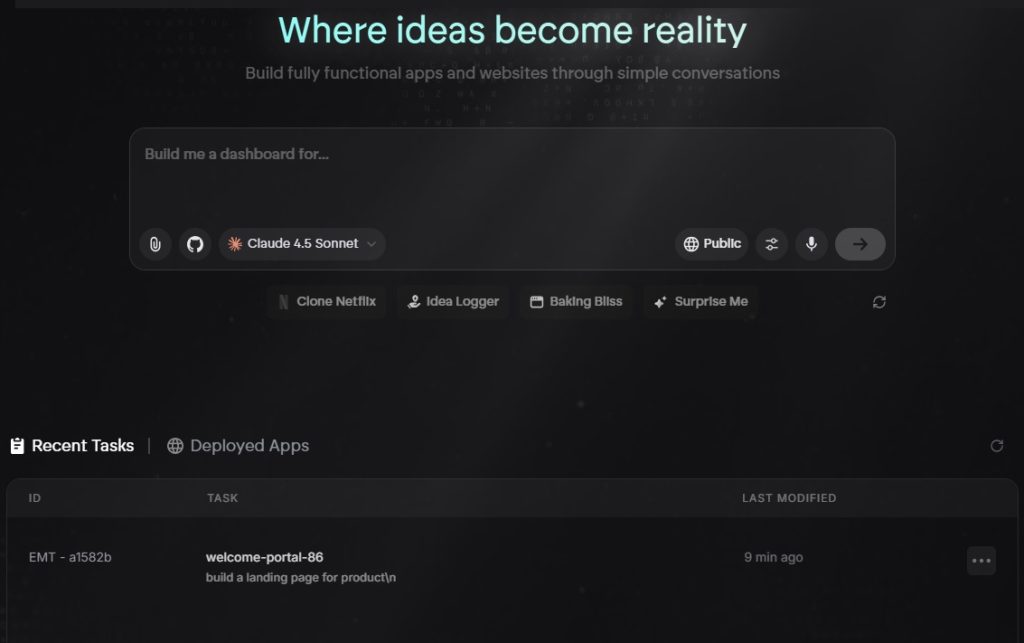Emergent AI is a notable AI tool in the agentic AI and no-code app building space, designed to automate full-stack application development from plain language prompts. Here’s a detailed, SEO-optimized review of Emergent AI covering its technology, features, user experience, pricing, and overall suitability for tech professionals and industries.
Introduction – Why Emergent AI Stands Out
Emergent AI stands out as a pioneering “vibe coding” platform that promises to build complete web applications from simple natural language descriptions. Unlike traditional coding tools, it offers an AI-driven approach where multiple AI agents collaborate, simulating a small development team to create production-ready apps quickly. This ambitious automation potential appeals to entrepreneurs, product managers, and technical users aiming to rapidly prototype and test software ideas without deep coding expertise.
What is Emergent AI?
Emergent AI is an AI-powered platform specializing in generating full-stack web applications based on user textual input. Its technology leverages an ensemble of AI agents, each working on distinct software components such as frontend interfaces (React), backend server logic (FastAPI), and database management (MongoDB). This orchestrated agent system aims to eliminate manual coding by translating vision directly into deployable software.
The platform’s purpose is to speed up software development, especially for quick prototyping or disposable projects. It’s not merely theoretical emergent intelligence but practical automation designed for non-technical and technical users alike. However, the tool is still evolving and better suited for experimental and early-stage use cases rather than mission-critical business applications.
Key Features
- Natural Language to App Generation
Users can describe their app idea in plain English, and Emergent AI transforms that into a working full-stack application employing AI agents specialized in UI, backend, and database coding. - Multi-Agent Collaboration
Different AI agents independently handle planning, frontend design, server-side logic, database structuring, and deployment, mimicking a software development team workflow. - Source Code Access and Export
Users receive full access to the generated source code, which can be exported to GitHub, allowing manual refinement or continuation of development outside the platform. - Private Project Hosting
Emergent AI offers private cloud hosting for user projects, enabling app testing and live deployment without external infrastructure needs. - Custom AI Agents and Context Windows
Higher-tier plans allow the creation of customized AI agents and feature a large context window (up to 1 million tokens) for more complex app logic and data processing. - GitHub Integration
Seamless integration with GitHub enables users to synchronize their generated code repositories directly, facilitating version control and collaboration.
User Experience
Emergent AI’s interface is designed for ease of use, with a focus on accessibility for both technical and non-technical users. The platform features intuitive prompts for app descriptions, with clear progress indicators as the AI agents work on different project stages. Integrations with GitHub and hosting streamline workflows for developers.
Nonetheless, user feedback highlights sporadic reliability issues and buggy outcomes, requiring manual debugging. Many users experience frustration due to AI-generated code errors and unpredictable credit consumption during app builds. Customer support reportedly lacks responsiveness, impacting the overall user experience negatively for some.
Performance and Results
Emergent AI delivers a mixed performance profile. It can rapidly generate prototype-level applications that meet basic functional requirements. However, the AI occasionally produces buggy code or hallucinates features, demanding user intervention to reach production-grade quality.
Benchmarks show credit depletion can be faster than expected due to debugging loops and inefficiencies, limiting extensive or complex app builds without purchasing additional credits. Its architecture demonstrates promise but is currently better suited to experimentation and hobby projects than large-scale or mission-critical deployments.
Pricing and Plans
Emergent AI offers tiered subscription models based on monthly credits required to build and maintain applications:
| Plan | Monthly Price | Credits | Key Features |
|---|---|---|---|
| Free | $0/month | 10 free monthly credits | Basic access to all features |
| Standard | $20/month | 100 credits | Basic app building, private hosting, GitHub integration |
| Pro | $200/month | 750 credits | All Standard features, 1M context window, custom AI agents, priority support |
| Team | $300/month | 1,250 credits (shared) | Pro features, unified billing, real-time collaboration for 5 members |
| Enterprise | Custom pricing | Unlimited | Advanced security, SSO, unlimited credits |
The credit system is crucial yet criticized for unpredictability. Many users find credits depleted rapidly, especially when the AI encounters errors. While the Standard plan is enough for small projects, serious development generally requires Pro or Team subscriptions and often extra credit purchases.
Pros and Cons
| Pros | Cons |
|---|---|
| Innovative multi-agent AI development | Unreliable, buggy app generation |
| Full source code export and GitHub sync | Unpredictable credit consumption |
| Rapid prototyping from natural language | Limited customer support |
| Private hosting and collaboration features | Not suited for mission-critical applications |
Best For
Emergent AI is best suited for tech-savvy entrepreneurs, product managers, hobbyists, and small development teams seeking rapid prototyping solutions. Startups testing new concepts and educational users exploring AI-assisted coding will benefit most. It is less suitable for enterprises requiring stable, production-grade applications due to current limitations in reliability and support.
Industries in early-stage digital product development or innovation labs could leverage Emergent AI to accelerate idea validation cycles.
Final Verdict
Emergent AI represents a bold step forward in AI-driven app development with its distinctive multi-agent approach. While its promise of fully automated code generation from natural language prompts is compelling, practical challenges in performance stability and credit management hinder widespread adoption for serious projects. It is a powerful experimental tool offering valuable insights into the future of software automation but is recommended primarily for prototype generation rather than core business functions.
Overall rating: 3 out of 5 stars — ambitious technology with room for maturity.
Conclusion
Emergent AI offers a glimpse into a future where application development can be democratized through artificial intelligence. Its unique agent-based system can produce web apps quickly from simple descriptions, ideal for prototyping and experimentation. However, due to buggy outputs, unreliable cost control, and limited support, it currently suits technical users and small projects more than critical or large-scale software development. Professionals should weigh the benefits of rapid innovation against the risks of instability and prepare for manual intervention in the generated code. Future improvements may elevate Emergent AI into a robust no-code AI development platform.



 Facebook
Facebook
 LinkedIn
LinkedIn
 X
X
 Reddit
Reddit